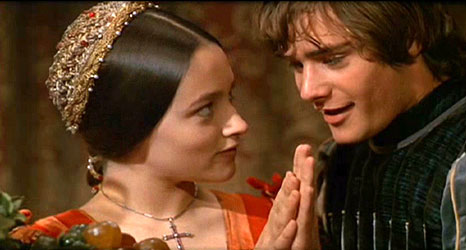
Texts and activities
to learn and practise English
This section will allow you to read articles and texts online and practise:
In order to use it, you must be logged in.
The number that you see refers to the number of articles you can read when you are not logged. Please go to the home page and log in, then return to this page to read the other articles and texts.
|
Romeo and Juliet
 Romeo and Juliet is the most famous love story in English literature. It is a tragedy written by William Shakespeare about two young lovers whose deaths reconcile their enemy families: the Montagues and the Capulets. They have to hide their love because they know that their parents will not allow them to be together. There are many obstacles on their way, like Juliet's cousin, Tybalt, and Romeo's friend Mercutio. The play was among Shakespeare's most popular works during his lifetime and, along with Hamlet, is one of his most frequently performed. Romeo and Juliet is the most famous love story in English literature. It is a tragedy written by William Shakespeare about two young lovers whose deaths reconcile their enemy families: the Montagues and the Capulets. They have to hide their love because they know that their parents will not allow them to be together. There are many obstacles on their way, like Juliet's cousin, Tybalt, and Romeo's friend Mercutio. The play was among Shakespeare's most popular works during his lifetime and, along with Hamlet, is one of his most frequently performed.
|
|
Infectious diseases
 Infectious diseases have represented throughout history the most important cause of death for the human beings and are still a major problem for public health worldwide. An infectious disease is a disease caused by a micro-organism that enters the body. The term micro-organism defines bacteria, protozoa, fungi, viruses and algae, all organisms that have a diameter less than 0.1 mm and are visible only under a microscope. Many micro-organisms are composed of single cells (unicellular), some others of more cells (multicellular) and others, like viruses, do not have a proper cellular structure. Infectious diseases have represented throughout history the most important cause of death for the human beings and are still a major problem for public health worldwide. An infectious disease is a disease caused by a micro-organism that enters the body. The term micro-organism defines bacteria, protozoa, fungi, viruses and algae, all organisms that have a diameter less than 0.1 mm and are visible only under a microscope. Many micro-organisms are composed of single cells (unicellular), some others of more cells (multicellular) and others, like viruses, do not have a proper cellular structure.
|
|
Le Certificazioni Trinity
 Trinity College London è un Ente Certificatore britannico che rilascia certificazioni e qualifiche riconosciute per la lingua inglese con esami a tutti i livelli di competenza. Trinity College London è riconosciuto come ente certificatore da parte dell'Ufficio di Regolamentazione delle Qualifiche e degli Esami e le qualifiche sono incluse nel Quadro Europeo delle Qualifiche (European Qualifications Framework - EQF). Tutti gli esami Trinity di lingua inglese sono riferiti al Quadro Comune Europeo di Riferimento per le Lingue (QCER). Trinity College London è incluso nell'elenco degli Enti certificatori pubblicato dal Ministero Italiano della Pubblica Istruzione. Trinity College London è un Ente Certificatore britannico che rilascia certificazioni e qualifiche riconosciute per la lingua inglese con esami a tutti i livelli di competenza. Trinity College London è riconosciuto come ente certificatore da parte dell'Ufficio di Regolamentazione delle Qualifiche e degli Esami e le qualifiche sono incluse nel Quadro Europeo delle Qualifiche (European Qualifications Framework - EQF). Tutti gli esami Trinity di lingua inglese sono riferiti al Quadro Comune Europeo di Riferimento per le Lingue (QCER). Trinity College London è incluso nell'elenco degli Enti certificatori pubblicato dal Ministero Italiano della Pubblica Istruzione.
|
|
The Little Mermaid

The Little Mermaid is a fairy tale by the Danish author Hans Christian Andersen about a young mermaid who wanted to give up her life in the sea and her identity as a mermaid to gain a human soul and the love of a human prince. The Little Mermaid lived in an underwater kingdom with her father the sea king, her grandmother and her six sisters. When she turned 15, she was allowed to swim to the surface to watch the world above. When she went to the surface, she saw a ship with a handsome prince and fell in love with him from a distance. A great storm came and the Little Mermaid saved the prince from drowning. She brought him unconscious near a temple and waited until a young girl from the temple found him. The prince never saw the Little Mermaid.
|
Darwin and natural selection
 On February 12th 2009 the world marked the bicentennial birthday of Charles Darwin, a scientist who holds a rightful place alongside Galileo, Copernicus, Newton and Einstein. His theory of evolution ties together disparate biological facts into a single unifying framework. When he published On the Origin of Species in 1859 he triggered a revolution in evolutionary thought. Naturalists had theorized about evolution for centuries before him, but their ideas were generally unfruitful, untestable or wrong. Darwin’s insight was not that a simple mechanism—natural selection—made evolution possible. Rather it was that in organisms whose environment changed nonrandomly and whose reproductive success in that environment depended on inherited traits, evolution became inevitable. On February 12th 2009 the world marked the bicentennial birthday of Charles Darwin, a scientist who holds a rightful place alongside Galileo, Copernicus, Newton and Einstein. His theory of evolution ties together disparate biological facts into a single unifying framework. When he published On the Origin of Species in 1859 he triggered a revolution in evolutionary thought. Naturalists had theorized about evolution for centuries before him, but their ideas were generally unfruitful, untestable or wrong. Darwin’s insight was not that a simple mechanism—natural selection—made evolution possible. Rather it was that in organisms whose environment changed nonrandomly and whose reproductive success in that environment depended on inherited traits, evolution became inevitable.
|
|
|
|
|
<< Inizio < Prec. 1 2 3 4 Succ. > Fine >>
|
|
Pagina 1 di 4 |